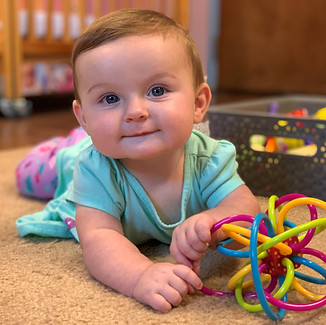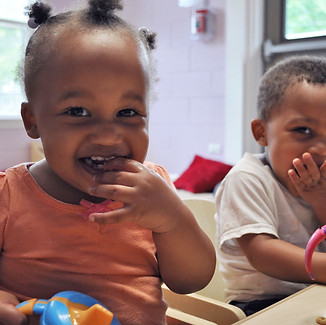
Infant II

Infant 1
Starting as young as 6 weeks old, infants are already beginning their educational journey at DCCDC. We strongly believe caregiving routines are the curriculum at this sensitive stage in life. Routines at school include diapering, feeding, sleeping, dressing, and greetings/farewells.
Our experienced, and dedicated Infant teacher carefully pays attention to infants non-verbal cues to respond quickly and ensure their needs are being met. When infant's needs are met, they then can move on to form positive relationships with their teachers and are free to explore independently.
Ratio: 1:4
Max Group Size: 4
Infant II
Infant 2
Around the age of 6 months, children transition to the Infant 2 classroom. Through responsive caregiving, infants are forming positive attachments to their teachers and begin passing many new, exciting developmental milestones!
The classroom environment is set up to allow open space so children can practice their emerging crawling and walking skills. Through songs, games, and conversation, infants in this classroom work on their language and social-emotional skills with purposeful teacher-initiated interactions.
Ratio: 1:4
Max Group Size: 5
Infant II
Toddler 1
Around the age of 12 months, children transition to the Toddler 1 classroom. At this age children are working to strengthen physical skills such as walking and grasping. They do this through planned fine and gross motor activities.
With purposeful teacher-initiated conversation, finger plays, rhymes, and songs, children practice listening, understanding, and expressing increasingly complex language.
Ratio: 1:6
Max Group Size: 11
Infant II
Toddler 2
Between the age of 18 to 30 months, children move to the Toddler 2 classroom. Through dramatic play and teacher-modeling, there is an emphasis on social-emotional skills such as regulating your own emotions and behaviors.
Children also work to develop cognitive skills such as problem solving, classification, and remembering and connecting experiences.
Ratio: 1:6 (until all children are 24 months, then 1:9)
Max Group Size: 13
Infant II
PK-1
At around the age of 30 months, advanced potty-training children embark upon more advanced learning as well as more complex interactions with their peers as they learn to participate cooperatively and constructively in group situations.
Children also expand upon previous literacy knowledge as they work to demonstrate emergent reading and writing skills.
Ratio: 1:9 (until all children are 36 months, then 1:10)
Max Group Size: 15
Infant II
PK-2
Once they’ve reached the age of 42 months, children transition to our PK-2 classroom. This classroom prepares children for entrance into public or private schools. They continue literacy development through learning to hold a pencil and writing letters of the alphabet.
Mathematical skills such as number concepts and operations, comparing and measuring, patterns, and exploring spatial relationships/shapes are a focus as well.
Ratio: 1:10 (until all children are 48 months, then 1:13)
Max Group Size: 17




.jpg)
.jpg)
.jpg)